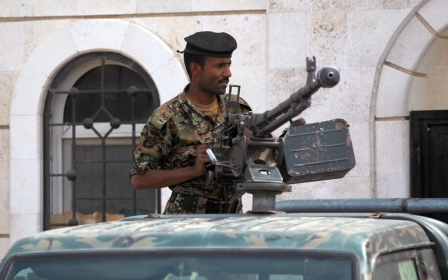Yemen suffers setbacks in al-Qaeda offensive

At least 30 people were killed in fighting between soldiers and suspected al-Qaeda militants in southern Yemen on Tuesday, as the army suffered setbacks in a new offensive to capitalise on recent drone strikes that reportedly killed dozens of fighters.
The assaults coincided with a meeting of the international group Friends of Yemen in London, where British Foreign Secretary William Hague backed efforts by the Yemeni military to give al-Qaeda “nowhere to hide” while urging the government to implement political and economic reforms if the country wants better delivery of $8bn worth of aid pledged to the Arab world’s poorest nation.
Army plans to 'purge' al-Qaeda
Fighting on Tuesday saw 18 Yemeni soldiers killed in separate ambushes in the south, with a further 10 injured and 15 more captured by suspected militants, security sources told the AFP.
Twelve militants were also killed when an ambush in the southern province of Shabwa sparked a firefight, tribal sources told the AFP.
Stay informed with MEE's newsletters
Sign up to get the latest alerts, insights and analysis, starting with Turkey Unpacked
National Security Chief Ali al-Ahmadi had told the agency prior to the offensive that the Supreme Security Committee had decided to “eradicate all forms of security problems” that have plagued the country since an uprising forced former president Ali Abdullah Saleh to quit in February 2012.
The Yemeni and US drone strikes on towns in southern Yemen are believed to have killed at least 60 people. The identity of those killed is yet to be confirmed, and there are ongoing DNA tests to establish whether Nasser al-Wuhuayshi, leader of al-Qaeda in the Arabian Peninsula (AQAP), was killed in the attacks.
International community
The underlying instability has been widely blamed for ongoing turbulence in Yemen. On Monday, unknown armed men opened fire on a vehicle carrying German embassy employees in Sanaa, injuring a diplomat, in what was a suspected kidnap attempt. Foreigners are regularly targeted for kidnap by groups linked with al-Qaeda, who use hostages as political leverage against the government.
The Friends of Yemen forum met in London on Tuesday, saying that although there have been pockets of success a grave humanitarian crisis remains in the country.
“The Friends of Yemen note that in spite of the progress made during the political transition the overall humanitarian challenges remain largely unchanged” the group said in a statement after the meeting.
Although a national dialogue process was completed successfully in January, with plans in the pipeline to draw up a new constitution ahead of planned elections next year, the situation on the ground has deteriorated.
More than half of the country’s 24 million population require humanitarian assistance. 10.5 million people are food insecure and 13 million people lack access to clean water and sanitation, according to the United Nations.
Yemeni officials have called on international partners to help tackle fundamental economic issues.
“To stabilise the political situation people need to see the standards of living, jobs and the services they lack,” Abu Bakr al-Qirbi, foreign minister of Yemen, told the Guardian on Tuesday.
“The Friends of Yemen need to prioritise so we can use the funds that are available wisely” he added.
The Friends of Yemen was set up in 2010 to coordinate international support for Yemen and is comprised of 39 countries and organisations. More than $8bn has been pledged in assistance, but much of it has not as yet been delivered.
“Due to the political changes which the government suffered from, and which also affected the performance of donor countries since the 2011 revolution, all of this resulted in a slowing down of the implementation of the pledges”, Amat al-Alim Alsoswa, director of the Executive Bureau for the Acceleration of Aid Absorption, told Reuters.
Only a fraction of the aid pledged to Yemen has been spent on much needed infrastructure projects, including the construction of new hospitals and road networks, due to ongoing political turmoil.
Some participants at the meeting in London said it had been a useful experience.
While others criticised a lack of inclusivity.
Prior to the meeting a group of Yemeni civil society groups released a statement criticising a narrow selection process for participants.
“The London conference has totally ignored Yemen’s civil society and its vital role in the country’s national development” the statement said. “This exclusion takes place despite the fact that our organisations continue to carry out extremely important development and humanitarian operations perhaps not deliverable either by the government international humanitarian agencies operating in the country.”
The Friends of Yemen will meet again in September at a meeting of the United Nations General Assembly in New York to reassess the situation.
Middle East Eye delivers independent and unrivalled coverage and analysis of the Middle East, North Africa and beyond. To learn more about republishing this content and the associated fees, please fill out this form. More about MEE can be found here.




